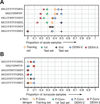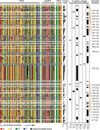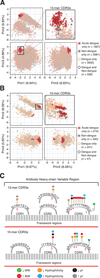Convergent antibody signatures in human dengue
- PMID: 23768493
- PMCID: PMC4136508
- DOI: 10.1016/j.chom.2013.05.008
Convergent antibody signatures in human dengue
Abstract
Dengue is the most prevalent mosquito-borne viral disease in humans, and the lack of early prognostics, vaccines, and therapeutics contributes to immense disease burden. To identify patterns that could be used for sequence-based monitoring of the antibody response to dengue, we examined antibody heavy-chain gene rearrangements in longitudinal peripheral blood samples from 60 dengue patients. Comparing signatures between acute dengue, postrecovery, and healthy samples, we found increased expansion of B cell clones in acute dengue patients, with higher overall clonality in secondary infection. Additionally, we observed consistent antibody sequence features in acute dengue in the highly variable major antigen-binding determinant, complementarity-determining region 3 (CDR3), with specific CDR3 sequences highly enriched in acute samples compared to postrecovery, healthy, or non-dengue samples. Dengue thus provides a striking example of a human viral infection where convergent immune signatures can be identified in multiple individuals. Such signatures could facilitate surveillance of immunological memory in communities.
Copyright © 2013 Elsevier Inc. All rights reserved.
Figures





References
-
- Altschul S, Gish W, Miller W, Myers E, Lipman D. Basic local alignment search tool. J. Mol. Biol. 1990;215:403–410. - PubMed
Publication types
MeSH terms
Substances
Grants and funding
LinkOut - more resources
Full Text Sources
Other Literature Sources
Medical

